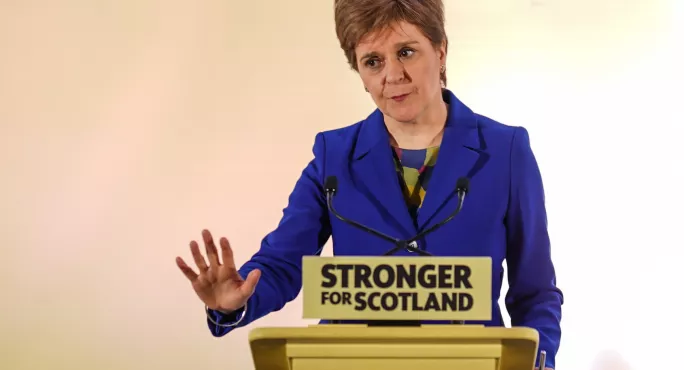Sturgeon should intervene in teacher pay dispute, say unions

Teaching union bosses have called on first minister Nicola Sturgeon to get directly involved in the teacher pay dispute.
Teachers need a “peacemaker” to prevent further strike action, with Nicola Sturgeon urged to intervene to facilitate an improved pay offer, one union boss said today as its members were on strike.
A pay offer of 6.85 per cent for probationer teachers and a 5 per cent rise for most was rejected by unions, who highlighted that, for the majority of teachers, this was the same as a previous offer. The EIS, Scotland’s largest teaching union, has been leading a campaign for a rise of 10 per cent.
Members of NASUWT Scotland and the Scottish Secondary Teachers Association (SSTA) walked out on their second of two days of strike action today. That followed the closure of almost every school in Scotland on 24 November, when EIS members went on their first national strike over pay since 1984-85.
- Exclusive: Almost 40% of places on secondary teaching courses unfilled
- Also today: Somerville defends move to reject key recommendation on SQA
- Also this week: Council funding gap equivalent to 17,500 teachers
Speaking during a rally organised by the Scottish Trades Union Congress (STUC) today, Seamus Searson, general secretary of the SSTA, said teachers were willing to go on strike again in the new year if a reasonable offer was not made.
He told the PA news agency: “We need a resolution; it doesn’t matter who comes [to the table].
“If the first minister is willing to come in and talk to us, then the sooner the better. But the offer they have made at the moment is not what we’re after.
“It’s not enough so we do need somebody to come in and be the peacemaker to get this resolved.”
Mr Season added: “Teachers are very angry. They feel they have been messed about. They feel they haven’t been shown proper respect.
“The government didn’t think teachers would take strike action but teachers have been forced into this because we’re trying to get a pay deal that should have been paid in April.
“The education secretary [Shirley-Anne Somerville] needs to find some money and come to the table to get this situation resolved. At the moment, we just feel that they are stringing us along.”
EIS general secretary Andrea Bradley took a similar view: “We’ve spent months now convincing, or seeking to convince, the education secretary of the worth of the teachers’ pay claim.”
The EIS has announced 16 more days of strike action starting in January, with walk-outs planned in two local authorities each day.
Ms Bradley suggested that an intervention from the first minister should take place “sooner rather than later”.
A spokesperson for the first minister, speaking to journalists during today’s strike action, was “not aware of any specific” interventions planned by Ms Sturgeon “beyond what we’ve said already”.
“The education secretary was saying yesterday we understand the point teachers are making, but equally there needs to be a recognition and an understanding that we’re operating within very tight finances, which are already significantly shortened by inflation,” the spokesperson added.
“We have to be realistic on that basis.”
When asked if teachers’ unions were unrealistic in the calls for a 10 per cent pay increase, the spokesperson said the Scottish government was “sympathetic” to teachers but that pay offers had to be “affordable” and there was no “bottomless pit of cash”.
Earlier today, NASUWT general secretary Patrick Roach spoke of “the depth of anger and frustration [teachers] feel at being continually told by ministers and [local authorities body] Cosla that there is no more money to increase their pay, while their workloads spiral and the expectations on them mount.
Dr Roach added: “They are sick of warm words telling them how much they are valued while their pay dwindles each year in real terms.”
The NASUWT said that it could not rule out more action in the months ahead if employers fail to deliver a fair and decent award.
Ms Somerville has said that the strike is in “no one’s interest” but that the government remains committed to finding a fair settlement for Scottish teachers.
She added: “It is very disappointing that the teaching unions have rejected the latest offer, the fourth which has been put to unions, which mirrors the deal accepted by other local government workers.
“The request for a 10 per cent increase for all teachers - even the highest paid - is not affordable within the Scottish government’s fixed budget.”
You need a Tes subscription to read this article
Subscribe now to read this article and get other subscriber-only content:
- Unlimited access to all Tes magazine content
- Exclusive subscriber-only stories
- Award-winning email newsletters
Already a subscriber? Log in
You need a subscription to read this article
Subscribe now to read this article and get other subscriber-only content, including:
- Unlimited access to all Tes magazine content
- Exclusive subscriber-only stories
- Award-winning email newsletters
topics in this article



